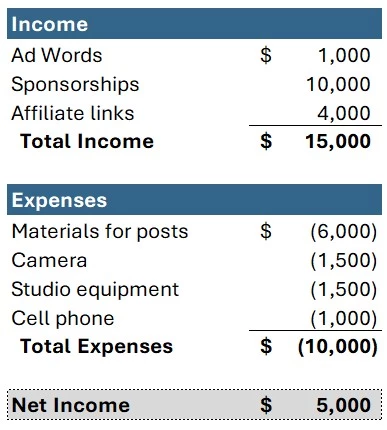Influencer and Content Creator Taxes: The Ultimate Guide

As a content creator, you spend hours crafting engaging videos, blog posts, and social media content to share with your audience. But amidst all the fun and creativity, it’s easy to overlook an important aspect of your work – taxes. Yes, influencer and content creator taxes can be daunting and overwhelming, but don’t worry – we’ve got your back! In this guide, we’ll break down everything you need to know to stay on top of content creator taxes.
Tracking Income & Expenses
We have a whole post on this topic, so be sure to check that out! When it comes to influencer and content creator taxes, one thing you don’t want to overlook is the power of organization. Keeping all your tax documents, receipts, and invoices in one place can save you a lot of headaches come tax season.
The best way to do this is to set up a completely separate bank account (and credit card if you choose) that is fully dedicated to your business. This will make tracking your income and expenses infinitely easier.
After you set up a business bank account, you should use some type of software that helps you track your expenses. Some choose to use a simple spreadsheet. We personally recommend a service like QuickBooks or Wave (we are not paid by these companies) where you can connect your bank accounts and better track your income and expenses. The most important thing is to set up a system that works for you.
By staying organized, you’ll be able to quickly and easily access all the information you need to file your taxes accurately. And, by staying organized, you won’t miss important tax write-offs.
Tax write-offs for Content Creators
Speaking of tax write-offs, as a content creator, you can deduct any expenses that are directly related to your work. This includes things like equipment, software, internet fees, and even props or costumes for your videos. When it comes to write-offs, the key is to keep track of all your expenses throughout the year. That way, come tax time, you’ll be able to easily calculate how much you can deduct from your income.
If you want a more comprehensive guide on write-offs, check out our post on that.
Do you need to file a separate return?
If you are set up as a single-member LLC or have no LLC at all, you do not need to file a separate business return from your personal return. However, you will need to fill out Schedule C and add that to your return.
As a single-member LLC, the government views your business as a pass-through entity. In simple terms, they view your business as an extension of you. So any profit your company makes flows right to you. This is great because it makes filing your taxes much easier.
The Schedule C will be very easy to fill out if you’ve been keeping a good record of your income and expenses.
If you are an S Corp, you will need to file a separate S Corp return (called 1120-S) that is due March 15th. The S Corp will then issue you a K-1 that you will use for your personal tax return.
What taxes will you owe?
If you had a positive net income (in other words, your income was higher than your expenses), you would owe taxes. All net income from your business will flow right into your personal return and you will not only owe your personal income tax, but also self-employment taxes.
Income tax
If you generate a net income of $50,000, you will owe federal and state taxes (unless you are lucky and live in a no-tax state like Florida).
Although you can just wait until the end of the year to pay these taxes, the government really doesn’t like that. In fact, they’ll hit you with fees if you do that. Instead, they expect you to make quarterly estimated tax payments throughout the year. You can use a simple online tax calculator to figure out your estimated total year obligation (based on your estimated earnings) and then divide that by four.
IRS estimated payments can be done online as well as your state-estimated taxes.
Self-employment taxes (FICA)
This is the tax most creators are not aware of…and this one is a doozy: self-employment taxes, also called FICA taxes.
Self-employment taxes include social security (12.4% of net earnings) and Medicare (2.9%) for a total of 15.3%! When you work a normal job, the employer will pay 1/2 of these taxes, or 7.65%, and you pay the other half.
But when you work for yourself, you pay the full 15.3% since you are both the employer and employee! Ouch! The “good” news is that 50% of this tax is deductible. The bad news is, this tax is massive.
So if you had net income of $50,000, you would owe $7,650 ($50,000 x 15.3%) in FICA taxes. And that is on top of your regular income tax.
Do you need to pay taxes as an influencer?
Whether or not you need to pay taxes depends if you made money after all of your expenses.
For example, let’s say last year you made $1,000 from Ad Words, $10,000 from sponsorships, and $4,000 from affiliate links for a total income of $15,000. To offset your income, during the year you had various expenses related to your business that totaled $10,000. That means you had a net income of $5,000 ($15,000 of revenue – $10,000 of expenses).

In this case, you will only need to pay taxes on that net $5,000. You can learn more about the nuances of paying taxes as a business in this post.
However, if you had expenses of $15,000 (or more) and your net income was $0 (or negative), then you don’t need to pay taxes. Sweet deal…although that also means you didn’t make any money. So there’s that.
But guess what, even if you don’t need to pay taxes on your business, you still need to file that Schedule C as part of your personal tax return. It’s silly, but you need to do it.
One thing to point out is that you want to avoid being classified as a “hobby” in the IRS’s eyes. If you operate at a loss for 3 out of 5 years, you run the risk of the IRS considering your business as a hobby. If that happens, you get to write off nothing and you owe taxes on the full income.
LLC vs. S Corp
All creators should create an LLC. Although your liability is very tiny, having an LLC will make your business look more legit in the IRS’s eyes (and help avoid you being classified as a hobby) and in the eyes of the brands you work with.
As mentioned above, there are no additional filings you need to do as an LLC. All income will be reported on Schedule C.
One misconception is that being an LLC will afford more tax write-offs. That is not true. A legit write-off is the same whether or not you have an LLC.
Now, that is not the same for S Corps. There are some potentially big benefits to being an S Corp if you are making more than $75k/year. The reason is, as an S Corp, you actually don’t pay FICA (self-employment) taxes on distributions.
But you do need to pay yourself a salary which adds more complications to your business. And you will need to file a separate tax return as well. But the additional administrative burdens will be worth it.
Let’s say you make $75k of net income and you are set up as an S Corp. If you pay yourself a reasonable salary of $60k, you will pay the remaining $15k as a distribution. You will owe the full FICA taxes on the $60k but will owe ZERO FICA taxes on the distribution! That means you can save $2,300 in taxes!
But given the requirement for a “reasonable salary” and the additional administrative burden, it usually doesn’t make sense to elect S Corp status until you hit $75k.
By the way, it is super easy to elect S Corp status. You just fill out this form and mail it to the IRS by March 15th.
Issuing 1099s to your contractors
If you used contractors during the year to help you edit videos or perform other work for you and you paid them more than $600, you will need to issue them a 1099 at the end of the year. This only applies to U.S.-based contractors!
When you sign up a new U.S.-based contractor, you should have them fill out a W9 to get their information. You will then use this to issue a 1099 at the end of the year.
Tax timeline
As a content creator, you’re likely familiar with the importance of consistency and sticking to a schedule. The same goes for your taxes. Mark your calendar for important dates throughout the year, such as estimated tax payment due dates and the filing deadline. If you miss a deadline, you may face penalties or interest charges, which can put a damper on your hard-earned income.
In general, here are the important deadlines to keep in mind:
- Federal and State personal income tax return: April 15th
- S Corp return (only if you have an S Corp): March 15th
- Deadline to issue 1099s to your contractors: January 31st
- Estimated tax payments: April 15th, July 15th, October 15th, and January 15th
Common Myths
There is a lot of terrible advice out there about what is and isn’t deductible. Make sure you have the correct information so you don’t land in hot water with the IRS. Check out our post on some of these common myths.
Conclusion
Paying taxes is inevitable if you are making money as an influencer. But that doesn’t mean you shouldn’t try to minimize those influencer and content creator taxes as much as possible! No one (except the government) will applaud you for paying more than your fair share.
So although paying taxes sucks, one way to think about it is this: If you’re paying taxes, that means you are making money and your brand is expanding! In this case, paying taxes is a sign you are being successful. 🙂
Schedule a call with us today so we can help you with your taxes and ensure you’re keeping as much of your hard-earned money as possible!
